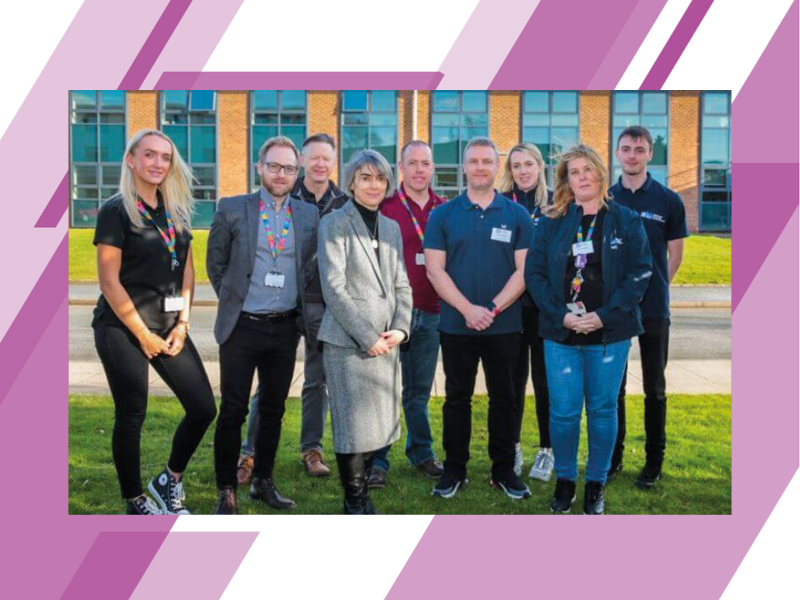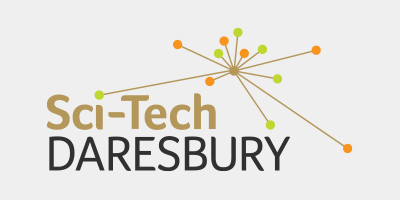May 12, 2022
UKRI CEO meets next generation of scientists and innovators
UKRI’s first five-year strategy was launched yesterday at the Sci-Tech campus at Daresbury.

UKRI’s first five-year strategy was launched yesterday at the Sci-Tech campus at Daresbury.
The strategy sets out how UK Research and Innovation (UKRI) will invest in people, places and ideas, and break down barriers between disciplines and sectors to tackle current and future challenges.
UKRI Chief Executive (CEO) Professor Dame Ottoline Leyser met with key partners, including some of the apprentices at Daresbury Laboratory.
These apprentices are working with advanced technologies and equipment on some of the most exciting, real-world research projects.
60 apprentices
More apprentices than ever are working at the high-tech facility, part of the Science and Technology Facilities Council (STFC).
The laboratory now has almost 60 apprentices, a dramatic rise over the last decade when there were only a few apprentices on site.
Recruitment for the next wave of new STFC Daresbury Engineering Apprenticeships is open for applications until 11 April.
Next generation scientists and innovators
This next generation of scientists and innovators are working across a range of specialist mechanical and engineering roles, for example:
- John Byrne, an electrical technician who completed a part-time degree course after his apprenticeship
- Luke Bladen, a senior mechanical technician who now manages an apprentice
- some of the original apprentices from the 1980s onwards are now involved in recruiting and training the growing cohort of new apprentices. Such as Rachael Buckley, who is now an Institute of Physics Honorary Fellow.
STFC’s Daresbury Laboratory links businesses to a range of unique, world-leading research facilities and expertise.
10,000 jobs by 2030
Professor Leyser said:
Sci-Tech Daresbury has a target to create 10,000 jobs by 2030 and to support the development of skills to fill them.
The range of skills and talents needed to drive the UK’s world-class innovation system is huge and often under-recognised. People and their ideas are our opportunities, and investing in talented people will unleash the region’s full potential. Daresbury Laboratory is exemplary in its commitment to putting apprenticeship training at the heart of what it does. This is why UKRI has put empowering people and places as key objectives in its new strategy launched yesterday. We want to see the success of Daresbury replicated across the country to foster a thriving research and innovation system where everyone can contribute and benefit.
Cutting edge research and innovation
Paul Vernon, Head of STFC’s Daresbury Laboratory, said:
Here at STFC’s Daresbury Laboratory, our apprentices are a huge asset to us, adding real value to the work we do.
Not only do they contribute to real-world research while they are learning, but they also get vital hands-on experience with some of the most advanced technologies and equipment available today.
In the process, they are helping to ensure that the UK has the skills it needs to stay at the cutting edge of research and innovation for decades to come.
Supporting our apprentices in their personal and professional development is extremely important, and we have a dedicated team to ensure that his happens.
This support has never been more important than in the last couple of years, particularly for those who found themselves in their first jobs and in completely new ways of working, thanks to the pandemic. However, their resilience has been outstanding.
It takes time and commitment to develop a successful apprenticeship scheme, but the results and benefits are absolutely worth it.
I couldn’t be more proud of our apprentices here at Daresbury, and look forward to supporting many more as our apprenticeship scheme continues to grow and thrive.
Developing, attracting, retaining
UKRI is committed to developing, attracting and retaining the full range of skilled people essential for the future research and development (R&D) workforce.
This is one of the key priorities in the new UKRI strategy.
This builds on other UKRI investments in the Daresbury and Liverpool City Region in skills.
For example:
- the construction of the new Glass Future Centre of Excellence in St Helens, which will bring 735 apprenticeship hours for the duration of the project and beyond
- the successful Knowledge Transfer Partnerships (KTP) programme continues to forge many local business and university links, and develop high-tech skills, for example:
- Runcorn-based Sandon Global has developed a very successful project with the University of Manchester. It has resulted in major R&D investment to create a global centre of excellence for the can and printing industry, and a new project to develop world leading digital manufacturing skills. The associate Dmitry Bogachov is a winner of KTP Future Leader Award
- Valuechain Technology, based at Daresbury, are working with University of Liverpool and associate Amber Bu. They are leading on building a secure and intelligent supply chain platform to drive global B2B matchmaking, supply chain connectivity and collaboration
- Innovate UK’s Women in Innovation award winners and Young Innovators are working across the north-west region. In Macclesfield, 2022 Young Innovator winner Peter Griffen has created a fully-adjustable footstool for patients with lower leg oedema. He created it in response to a request by staff at Royal Brompton Hospital in London, who felt the existing devices weren’t up to the job. Peter now has several models of the mechanism and is producing a full-size prototype for evaluation by clinical staff.



